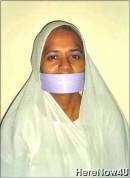 |
| Sadhvi Nirvan Shree |
Paryushan 2007 Celebrations
Day 5
Anuvrat Diwas
13.09.2007
The great ascetic Gurudev Shri Tulsi, one of the greatest preachers of Jainism, had a dream of a one-week series of discoveries. These discoveries are structured on three basic themes: (1) Anuvrat, (2) Preksha Dhyan, and (3) Jeevan Vigyan.
Anuvrat is a code of conduct of non-violence, of non-sectarian religion or universal religion. Anuvrat is a sacred resolve to give up violence and adopt non-violence & the just principle of transforming the individual & society in a good resolve.

In the venue of Terapanth Bhawan amidst the presence of thousands of lay followers (Shrawaks & Shrawikas), Sadhvi Shree Nirvanshreeji addressed that, “It is the call of the inner soul which provides the ground for good resolution with a pure heart. Only when the individual is detached to the materialism he can move towards accepting austerities. Importance of Samyaktwa multiplies when austerities become part & parcel of one’s Life. Contemplation of emotions and practice of GUPTI (manah gupti, kaya gupti and bhasha gupti) enables a Sadhak (worshipper) to consecrate austerity.
 Sri dharamchand rakhecha in frontline among laypersons doing samayik
Sri dharamchand rakhecha in frontline among laypersons doing samayikSadhavi Shreeji further said – “The festival is festival of self restraint and self control. Anuvrat Andolan emphasizes the importance of character building. People right since independence were engaged in the materialistic development of the nation and nobody gave adequate concern over the moral building of the nation. It was Ganadhipati Acharya Shree Tulsi, who pointed this out in 1949, at Sardarshar (in Rajasthan), when the sapling of Anuvrat was sown, which is now on the way to become a huge flourishing tree. The movement was launched with a view for character building, purification of life, development of willpower & self-realisation. Inculcation of Right Faith, Right Resolve & Right Conduct is the philosophy of the Anuvrata. The removal of discrepancy between precept & practice is its objective. Anuvrata means ‘little vow’ which are for lay people, living family lives.

The Anuvrat is a religion free from sectarianism. It is a project for the spiritual and moral rejuvenation of life, aiming at the total good of a person. It helps makes a man a ‘human’ in real sense. The code of conduct of ANUVRAT is so formed that it is not restricted to a particular caste or creed, instead has a universal applicability.
On this occasion, Shree Bhawarlal Singhi, the comparer said, although Anuvrat is a small & simple world but has huge capability of creativity in itself. It’s objective & codes are very simple, useful as well as universal. The 11 codes of conduct (5 vows & 6 Avashyakas) as initiated by the Anuvrat helps change the lifestyle & bring close to its own self.
 Sadhvi yogkshemprabha
Sadhvi yogkshemprabha at
Terapanth Bhavan, 9a, Anuvarat Sarini, Kolkata. phone no.033/24768878
(click on any photo to see more of this event)



